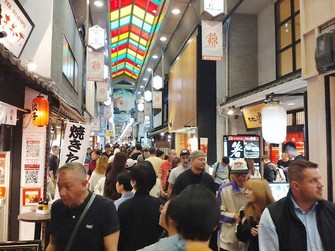
Crowds of tourists are seen in Nishiki market in Kyoto’s Nakagyo Ward on April 20, 2024. (Mainichi/Kenichiro Fuji)
TOKYO (Kyodo) — Ninety-two municipal governments across Japan have considered introducing lodging taxes at hotels and traditional Japanese ryokan inns, results from a recent Kyodo News survey showed.
A total of 42 municipalities have either already introduced or plan to introduce lodging taxes, with the figure likely to rise as many aim to utilize the levies to develop tourism infrastructure amid surging inbound arrivals.
The survey conducted between June and July garnered responses from a total of 1,723 local governments, or 96 percent.
To introduce a lodging tax, local governments must enact an ordinance and gain the approval of the Minister of Internal Affairs and Communications.
Out of the 35 governments that have already obtained approval, 12 had already implemented lodging taxes as of the end of July. The remaining 23 plan to do so by 2026.
According to the survey, at least seven local governments have already enacted ordinances and plan to obtain approval.
Though they are yet to seriously consider it, 728 municipalities said they are “interested” in introducing lodging taxes, while 506 said that they are not interested in doing so.
Another 60 said they considered introducing lodging taxes but decided not to do so, while 296 gave the answer “other,” citing reasons such as not having accommodation facilities in their jurisdictions that can be subject to taxes.
When asked about the intended use of the tax revenue in a multiple-choice format, the most common response at 537 was to “develop tourism facilities.”
Next, 434 governments said they would use revenue to promote tourism in general. Some 242 said they would use the funds for preservation of historical landscapes and natural environments, and 228 said they would improve infrastructure for accommodating foreign visitors.
Among the 92 governments that are considering the taxes, one expressed concerns such as the need to clearly indicate how revenue will be used in a way that taxpayers can understand, while another was worried about the heavy administrative burden on small-scale accommodation facilities.
Many municipalities that have already introduced or are planning to introduce the tax have set the accommodation rate at around 200 yen ($1.4) per person per night.
In some cases, the rate was set at 1,000 yen or more for expensive accommodation facilities.


AloJapan.com